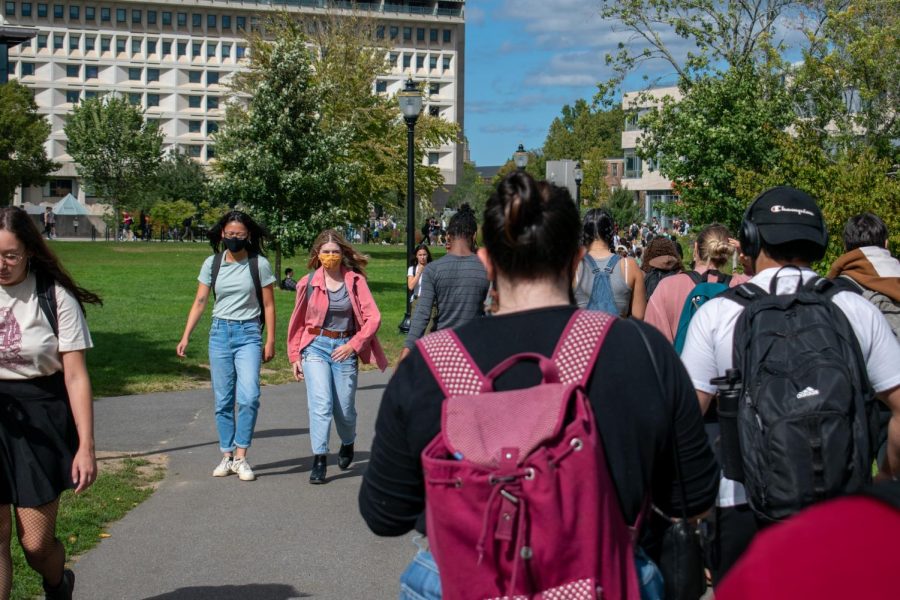The University of Massachusetts will lift its mask mandate in most indoor settings on Wednesday, March 9, at 7 a.m., according to an email sent to the UMass community on Tuesday afternoon.
The University cited the “significantly improved public health environment” of the UMass campus and recent guidelines from both the U.S. Center for Disease Control and the Massachusetts Department of Public Health in its decision to lift the mandate.
“Data indicates that severe illness is extremely rare within our highly vaccinated and boosted community,” the email read. “This change is a significant milestone as we continue to emerge from challenging times.”
The University still recommends mask usage for individuals who have a weakened immune system or who live with those that do. Individuals who are not fully vaccinated and boosted are also expected to continue wearing masks indoors. Students will still be required to wear masks aboard public transportation, in healthcare facilities on campus and in the Center for Early Education and Child Care.
The University is also still asking individuals of the campus community to monitor themselves for COVID-19 symptoms every day before coming to campus and to stay home if feeling unwell.
UMass students have different thoughts on the University’s decision to cease requiring masks. Prisha Singh, a junior studying biomedical engineering, does not think it is a good time for the University to lift the mask mandate, citing low testing numbers and an increase in traveling that will occur over spring break. “I think that cases are still on the rise,” Singh said.
Domenic Collela, a sophomore studying legal studies, said that it is “absolutely” a good time for the University to lift the mask mandate. He said he is especially looking forward to not having to wear a mask at the Recreation Center.
UMass’ lifting of its mask mandate follows the same action by UMass Lowell on Feb. 28., as well as UMass Boston’s easing of other COVID-19 restrictions, which Collela said he believes definitely played a part in UMass’ decision to do the same. “They’re all under the same UMass name. Might as well keep it uniform,” he commented.
The University’s decision to cease mask requirements also trails results of the UMass Student Government Association’s spring 2022 election. A ballot question present on the spring ballot asked students whether the University should or should not lift its mask mandate. Out of those who voted on the ballot questions during the election, 71.76 percent of students voted for the University to lift the mask mandate while 28.23 percent voted to keep it in place.
Ana Bertino, a sophomore economics major, is also glad to see the mask mandate lifted and believes that the results of the election and the “input of students” shaped the University’s decision in lifting the mandate.
Individuals in the campus community are welcome to wear masks “at their own discretion,” per Tuesday’s email, though individuals and departments are not allowed to create mask requirements that stray from or are more restrictive than those of the University. While the mandate is being lifted at this time, co-directors of the Public Health Promotion Center, Ann Becker and Jeffrey Hescock, recognize that the COVID-19 pandemic is still fluid and may require the mask mandate to return.
The email encouraged the campus community to “respect the choices that individuals will make about their own masking,” adding that KN95 masks will still be available at the Public Health Promotion Center in the Campus Center. University Health Services will still provide symptomatic testing and unobserved test kits.
Ella Adams can be reached at [email protected] and followed on Twitter @ella_adams15. Saliha Bayrak can be reached at [email protected] and followed on Twitter @salihabayrak_.






















Kevin A. Young • Mar 9, 2022 at 1:16 pm
Even if 90% of students supported lifting the mandate, what about the minority of students who are immunocompromised or who care for those who are? The rights of medically vulnerable students to be safe outweigh the rights of the students who refuse to mask — just as the latter shouldn’t have a right to refuse vaccines, since that decision affects others. One right is a matter of safety, while the other “right” is just a personal preference. A student who’s helping to care for a vulnerable parent or a prematurely born infant (for example) faces potentially dire implications. That is not the case for a student who refuses to mask. Allowing people to wear masks “at their own discretion” is virtually useless: if infected people around me aren’t wearing masks, I gain relatively little protection from wearing one myself.
I have yet to see a clear definition of the university’s benchmarks for lifting or reinstating the mask mandate. What levels of infection, illness, and death does the administration consider acceptable? If there is a new uptick in cases, at what point will the administration reinstate the mandate? Given that we have not received that information, I have little confidence that the administration is not making its decisions based on financial considerations (i.e., pandering to students who don’t like masks so that they stay enrolled). We deserve transparency regarding the decision-making process — not just vague statements of principle, not rosy reassurances about how most illness is mild, and not policymakers who hide behind the CDC’s lax and pro-business guidelines.